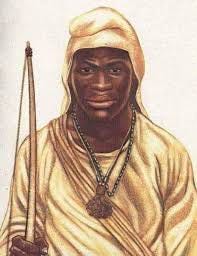Sundiata Keita: The Lion King Of Mali
The triumphant story of the king that founded the Mali empire and one of the greatest kingdoms in African history
One of the most enjoyable aspects of working on my platform is the discovery of wonderful hidden stories of African history. When I say ‘hidden,’ many of these stories are in plain view if you know where to look and what you’re looking for. However, the reality is that few of us have that guidance and thus miss out on so many remarkable stories of our past.
Many know of Mansa Musa, the ruler of Mali and richest man that ever lived. What I found out is that he wasn’t the only famous and important ruler of Mali. There was another before him known as the ‘Lion King.’ His name was Sundiata Keita, and his story is straight out of an epic action fantasy film.
PAY ATTENTION
Sundiata Keita began his life as an unlikely hero. Born in the early 13th century to Maghan Kon Fatta, the King of Niani, and Sogolon Kedjou, a woman of prophetic significance, Sundiata's early years were marred by adversity. Unlike other royal offspring, he did not exhibit the physical prowess expected of a future ruler. In fact, he was crippled and unable to walk until the age of seven, a condition that led many to doubt his destiny. Yet, it was precisely this frailty that laid the foundation for his remarkable journey.
Sundiata’s mother, Sogolon, possessed a resilience that she instilled in her son. She was often ridiculed, and Sundiata's condition became a source of mockery for his father's other wives and children. However, Maghan Kon Fatta, influenced by a prophecy that Sogolon’s son would one day be a great king, remained protective and hopeful. Things took a dramatic turn when Maghan Kon Fatta passed away. The throne was seized by Dankaran Touman, Sundiata’s half-brother, under the influence of his power-hungry mother, Sassouma Bereté. Sundiata and his mother were then forced into exile, a move that was intended to permanently remove them as threats to the throne.
Exile proved to be a crucible for Sundiata, transforming him from a frail boy into a formidable leader. As they wandered through various kingdoms, Sundiata learned about politics, diplomacy, and warfare. His encounters with different cultures and leaders broadened his perspective and sharpened his strategic acumen. During their time in the Mema kingdom, Sundiata came of age. Under the tutelage of the Mema king, he mastered the art of war and governance. His physical strength blossomed, and the legend of his bravery and wisdom began to spread. He became everything those around him in his youth believed he could never be; a true leader in physical stature and intellect who inspired all those around him.
Meanwhile, the Mali Empire was crumbling under the tyranny of the Sosso king, Soumaoro Kanté. Soumaoro, a powerful sorcerer and ruthless warrior, conquered and oppressed the lands surrounding Mali, including Sundiata’s homeland. Then Sundiata had his calling from the oppressed people of Mali. They remembered the prophecy that his father Maugham Kon Fatta saw that there was greatness in Sundiata and the people looked to him as their saviour. The time had come for Sundiata’s return home.
It was his destiny.
This whole thing was giving me Batman Begins vibes and Bruce Wayne’s time with Leauge Of Shadows before returning to save Gotham.
With the support of the Mema king and other allies he had garnered during his exile, Sundiata assembled a formidable army. His return to Mali was not merely a quest for personal vengeance but a mission to liberate his people and restore the glory of his ancestral land.
With every great epic story, you need a dramatic climax and this one doesn’t disappoint. Sundiata and his army confronted Soumaoro Kanté on the plains of Kirina in a final battle that was a test of wills, sorcery, and military prowess. Soumaoro, confident in his magical invincibility, underestimated Sundiata’s strategic genius and the loyalty of his diverse forces. Utilizing both his knowledge of magic and conventional warfare, Sundiata managed to exploit Soumaoro’s weaknesses.
According to legend, Sundiata’s sister, Nana Triban, and his close friend, Fakoli Koroma, provided crucial intelligence that helped him break Soumaoro’s defenses. The defeat of Soumaoro at the Battle of Kirina was not merely a military victory; it was a symbolic triumph of good over evil, resilience over tyranny.
Sundiata’s victory ushered in the golden age of the Mali Empire. He unified the fragmented Mandinka kingdoms and established a centralised government that promoted justice, trade, and scholarship. The once-exiled prince became the revered emperor, Mansa Sundiata Keita, whose reign laid the foundations for one of the most prosperous and culturally rich empires in African history.
Among Sundiata Keita's most significant achievements was the establishment of the Mandan Charter, also known as the Kouroukan Fouga, following his consolidation of the Mali Empire. The Kouroukan Fouga is said to be one of the earliest recorded constitutions of human rights.
This charter, proclaimed at a grand assembly of various clans and tribes, laid out a comprehensive framework for governance, social structure, and legal systems. It established a hierarchical organization of officials and councils to ensure balanced power distribution and accountability. The charter also enshrined the rule of law, providing a legal framework for resolving disputes through courts and appointed judges, and emphasized fairness and impartiality in justice.
Notably, the Mandan Charter included progressive principles on human rights, recognising individual freedoms and equality before the law, making it one of the earliest known charters of human rights and governance. Sundiata Keita was an amazing king, proving the prophecy his father saw to be true. Sundiata’s legacy, immortalised in the oral traditions of the griots, continues to inspire and captivate.
To commemorate Sundiata Keita, he is included in the KINGS OF AFRICA mug collection that you can get right now in The Alkebulan Shop as well as other great kings of Africa that I will be covering. The mug has a high quality image of Sundiata on the front and a summary of his history on the back.
You can also get the full set of 8 Kings Of Africa Mugs featuring Sundiata Keita, Mansa Musa, King Shaka, Oba Ovonramwen, Menelik II, Ramses II, Haile Selassie and Sultan Moulay Ismail. They are all available now.







Synchronicity. I was just thinking of Sundiata in relation to a piece I’m publishing later today here on Substack.